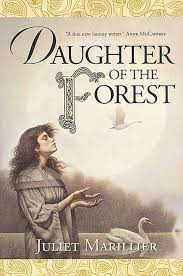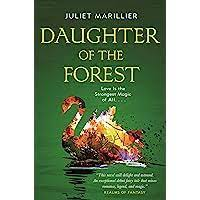Write like a … tree?
A post at Writer Unboxed that caught my eye because of the title of the post, and also because it was written by Juliet Marillier: Write Like a Tree
I’ve loved the books of Marillier’s that I’ve read, beginning with Daughter of the Forest. Her writing is absolutely lovely.

This is the cover I have, a lovely cover.

The new cover, not bad, but I don’t think it captures the tone of the story
“We all accepted that this land was a gate to that other world, the realm of spirits and dreams and the Fair Folk, without any question. The place we grew up in was so full of magic that it was almost a part of everyday life – not to say you’d meet one of them every time you went out to pick berries, or draw water from your well, but everyone we knew had a friend of a friend who’d strayed too far into the forest, and disappeared; or ventured inside a ring of mushrooms, and gone away for a while, and come back subtly changed. Strange things could happen in those places. Gone for maybe fifty years you could be, and come back still a young girl; or away for no more than an instant by moral reckoning, and return wrinkled and bent with age. These tales fascinated us, but failed to make us careful. If it was going to happen to you, it would happen, whether you liked it or not.”
You see? Lovely writing. I grant, I didn’t particularly like her 12 Dancing Princesses retelling, Wildwood Dancing. That’s because of protagonist ineffectuality, nothing else. I haven’t read anything by Marillier for a long time. No doubt I should. Harp of Kings, maybe. Heart’s Blood. Have any of you read either of those?
But, back to the post about writing like a tree. What can that mean? Start with the trunk — the theme, maybe? — and then branch out? Or maybe start with the roots deep in the soil — the author’s experience and vision — and let the story grow from that? or something else? Let’s take a look …
‘There were trees here once, in another age,’ Mother Rowan said. ‘Great, wonderful trees something like the one you called the Ancestor. Such things they witnessed in their long lives: the fall of kings, the deeds of heroes, the passing away of tribes and the grief of survivors. Courage and cowardice; justice and tyranny; love and hate. No wonder old trees are so full of wisdom.’
That’s a tidbit from Marillier’s current WIP. Then the post, with this conclusion:
Writing can be more powerful, more thought-provoking, perhaps also more comforting, if it comes from deep roots, long memories, storm and calm, the passing of seasons. Writer, imagine yourself as a tree, whether it’s a towering larch, a stately oak or a compact hawthorn. Think about your roots: family, tribe, culture. Place of birth and growing up; places that are important in your life; place of the ancestors. Think about your branches, your leaves, your bark: experiences, growth, change; give and take.
So it’s the latter. Let your writing grow from your own roots, your own experience — your own voice. That’s probably unavoidable. But perhaps it’s not bad advice, even if it’s also unavoidable. It could be heard this way: Don’t try to write to the market. Don’t try to write something you don’t like yourself. Don’t try to write a story that you yourself find unbelievable at its heart. I think that’s all good advice.
 Please Feel Free to Share:
Please Feel Free to Share:







The post Write like a … tree? appeared first on Rachel Neumeier.



